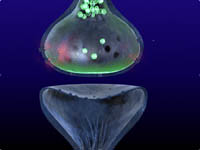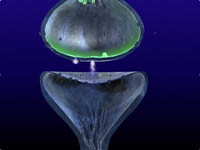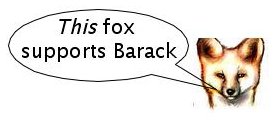Alcoholics, junkies, crackheads, pill poppers, tweakers. Stick 'em in a detox unit together and they'll soon realize they have something in common. They all smoke. But, apart from that, they share a common goal. It can be summed up in two words. Gimme more.
Nerves transmit information which is processed by particular areas of the brain to elicit a response. The information is transmitted as an action potential, a transient change in the resting voltage that exists across a nerve's cell membrane. When this wave of depolarization reaches the nerve ending, pockets of a chemical neurotransmitter are released into the space between that neuron and the next, the synapse.



The neurotransmitter interacts with receptor proteins on the outside of the post-synaptic neuron and the action potential is regenerated. Since persistent neural transmission is generally undesirable, the signal is rapidly terminated by re-uptake of the neurotransmitter by protein channels on the surface of the pre-synaptic nerve ending. Each neuron typically uses one particular neurotransmitter to relay information.
When we consider that this form of neurotransmission can be "filtered" by the impact of other neurons using different neurochemicals, known as neuromodulators, and the fact that each part of the brain uses different sets of neurotransmitters and neuromodulators, we start to see the immense complexity of the brain.
Less than 1% of the brain's neurons use the neurotransmitter dopamine to communicate with other neurons. Yet this fairly simple chemical (its chemical structure is next to Foxy's head, above) plays a central role in behavior such as motivation, pleasure seeking, survival and learning. Disruption of dopamine levels underlies psychosis, schizophrenia, Parkinsons disease and addiction.
Part of the brain is responsible for sensing and processing information that is important for survival and preservation. Sensory information related to fundamental cues that are key to survival, such as food, sex and danger is relayed to the ventral tegmental area (VTA) of the brain, from where it is sent to the nucleus accumbens (NAc) for processing. The response to this processing is either one of attraction (the smell of fresh baked bread, the sight of Jessica Alba/Brad Pitt in a swimsuit - take your pick) or repulsion (the sight and smell of Dick Cheney in a swimsuit). Since it was once thought that pleasant stimuli were the overriding motivators, the NAc used to be referred to as the brain's reward center. Now that its realized that fear signals equally impact the NAc, its function is more often referred to as a salience processor. In chemically dependent individuals, however, the VTA-NAc axis might best be referred to as the Gimme more center of the brain.
All drugs of addiction produce an increase in dopamine levels in the NAc. Some drugs have a direct effect on dopamine levels. Amphetamines increase release of dopamine from pre-synaptic nerve endings. Gimme more tweak. Cocaine decreases reuptake of dopamine by these nerve endings, causing an elevation in synaptic dopamine. Gimme more coke. Other drugs exert their primary action on other neurotransmitter systems, but ultimately impact dopamine levels. Gimme more booze, smokes, smack, vicodin, xanax, ex, weed. Just gimme more.
Normal environmental stimuli, like food and sex, elicit a satiety signal once enough has been experienced, mediated in part by another neurotransmitter, serotonin. However, although some drugs, like nicotine and heroin, may create a temporary feeling of satiety, most drugs, including alcohol, override this signal completely. Enough is never enough.
In response to the ever increasing supply of drug-induced dopamine in chronic addicts, the NAc starts to compensate by decreasing the number of post-synaptic dopamine receptors. This desensitization causes the need for even more drug to achieve the same effect as before and tolerance sets in. The addict becomes faced with two alternatives; continue the upward spiral of tolerance and craving or quit. Titrating off the drug is no longer an option. The former option almost inevitably results in death. Choosing the latter option slowly resets the balance between dopamine and serotonin in the brain and craving becomes less intense and less frequent.
But, why do most addicts relapse, often many years after gaining sobriety? Though there are many reasons, one of the strongest provocations for relapse is drug associated memory. A recovering drunk or crackhead puts him or herself at risk simply by walking into a bar or a crackhouse. Proximity of the previously used drug, even years after use, can trigger powerfully persuasive memories. Often the drug associated memories are more subtle; the clink of ice cubes in a glass tumbler for the recovering alcoholic or the early morning coffee for the ex-smoker.
Two recent scientific studies have shed some light on the nature of this phenomenon and point to possible avenues of clinical intervention.
In last week's issue of the journal Nature, the world's leading science publication (yours truly has a couple of papers published in it, LOL!), Liu et al studied the effect of repeated doses of cocaine on the VTA in mouse brains. Mice and rats are most often used in addiction physiology experiments because their brains are sufficiently similar to those of humans to allow extrapolation of the results to people, besides alcoholics and addicts are not the most reliable of subjects. Cocaine is most often used as the drug of addiction because it directly impacts dopamine-using neurons and rats and mice evidently like it.
The researchers found that repeated doses of cocaine induced a phenomenon called long term potentiation (LTP) in the VTA of mouse brains. LTP is a basic form of memory in which subtle long lasting changes in synaptic function can store information. They determined that the effect of cocaine was to block the impact of another neurotransmitter, GABA, on dopamine synapses. GABA is a so-called inhibitory neurotransmitter which tunes out many neuronal pathways. Its receptors are a major target of both alcohol and benzodiazepines like valium and librium, indeed the researchers found that valium inhibited cocaine-induced LTP. The results suggest that stimulation of GABA receptors in the VTA might be an effective way to reduce craving and drug associated memory in individuals addicted to cocaine and quite possibly many other drugs. Notably the anti-epileptic drug vigabatrin, which mimics GABA, is currently in clinical trials for coke addiction.
In a recent issue of the journal Neuron, the effect of cocaine on the retrieval of memories elicited by environmental cues in rodents was examined. The establishment and maintenance of drug associated memories by conditional stimuli is known as consolidation. The retrieval of these memories involves a reinforcement process termed reconsolidation which requires the activation of a pattern of genes within neurons. Miller and Marshall identified a signaling pathway inside the NAc which appears to mediate reconsolidation in response to an environmental cue. Such signaling pathways are chains of molecular events which transduce a message, in this case from dopamine, from outside a cell to the cell's nucleus where gene programs are activated to produce proteins. The particular pathway activated by dopamine is one very familiar to scientists working in the field of cancer research, since it is hyperactivated in many types of cancer. For this reason it has been the subject of intensive research and drugs have been developed to block the passage of information along the pathway. Using one such drug, the researchers showed that inhibiting the pathway markedly reduced stimulus-elicited reconsolidation. Although the drug used is probably too toxic for use in chemically dependent people, the results identify multiple potential targets for clinical intervention.
Taken together, the studies reaffirm that expanding our understanding of how drug associated memories are retrieved may lead to the development of specific drugs to reduce drug craving and the danger of relapse in recovering addicts.
Until then,
Gimme more espresso, gimme more smokes, gimme more diet red bull. Just fucking gimme more!




